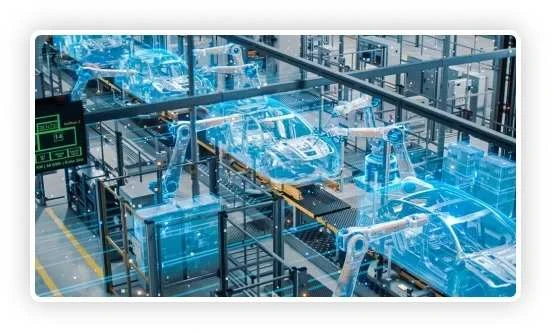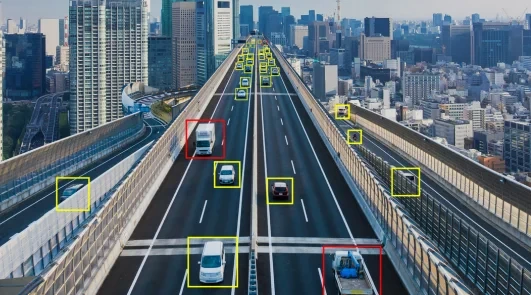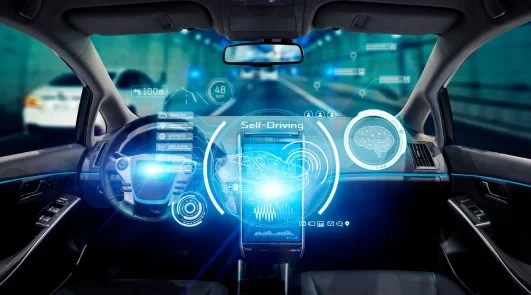AI Training Data For Automotive Industry
AI Data Solutions for the Automotive Industry
A high-resolution image showcasing an automotive environment, perhaps a car assembly line, a modern car’s dashboard with digital interfaces, or autonomous vehicles on the road.

Home » Industries » Automotive
Solve your business problems with ours
industry solutions

Sensor Data
- Sensor data, collected from onboard sensors, including LiDAR, radar, cameras, and ultrasonic devices, is crucial for the development of autonomous driving technology.
-
.These sensors continuously capture a wealth of data about the vehicle’s surroundings. For instance, they monitor the positions of other vehicles, pedestrians, road conditions, and traffic signs.
-
Machine learning algorithms and computer vision systems analyze this data. Consequently, they help vehicles perceive and interpret their environment in real-time.
- This data-driven approach is, therefore, fundamentally important in enabling autonomous vehicles to make informed decisions. Moreover, it allows them to navigate safely and respond effectively to dynamic road situations.
- As autonomous driving technology advances, sensor data, therefore, plays a pivotal role in enhancing the safety and reliability of self-driving vehicles.

Telemetry Data
- Telemetry Data encompasses vehicle status information. Specifically, it includes data points such as speed, RPM, fuel level, and temperature.
- These data elements, therefore, provide valuable insights into driving patterns, vehicle performance, and the overall health of the vehicle.
- Telemetry data is essential for monitoring vehicle conditions, diagnosing issues, and optimizing maintenance schedules. Consequently, these practices are crucial for vehicle efficiency and safety.
- By analyzing this data, automotive professionals and vehicle owners can, therefore, make informed decisions about maintenance, fuel consumption, and driving habits.
- Telemetry data is a cornerstone of modern vehicle management systems, and it significantly contributes to improved vehicle performance, longevity, and fuel efficiency.

Traffic Data
- The Car Dataset encompasses a wide range of information. Additionally, it includes traffic signal timings, which are crucial for understanding the flow of vehicles.
- This Car Dataset is invaluable not only for traffic management but also for urban planning, offering insights into traffic patterns and trends. Moreover, it plays a crucial role in predictive analytics in transportation systems.
- By analyzing traffic data, city authorities can optimize signal timings. Consequently, they can reduce congestion, thereby improving the overall flow of vehicles.
-
Additionally, predictive analytics based on historical traffic data can significantly help forecast traffic patterns. Consequently, this enables better decision-making for route planning and infrastructure development.
- Overall, traffic data plays a vital role in enhancing transportation efficiency. Additionally, it helps in reducing commute times and, consequently, enhances urban mobility.

Road and Map Data
- Road and map data, including high-definition maps and real-time updates on road conditions, construction zones, and lane changes, are indispensable for autonomous navigation systems.
- High-definition maps serve as a crucial reference point for autonomous vehicles. For instance, they not only provide detailed information about road layouts, lane markings, and infrastructure but also enhance the vehicle’s ability to navigate complex environments.
-
Real-time updates, such as road closures, accidents, and construction activities, enable vehicles to make dynamic route adjustments, ensuring safe and efficient navigation.
- These data-driven maps and updates are essential, as they provide crucial information for ensuring the safety and accuracy of autonomous vehicles as they navigate through complex urban environments.
- As autonomous navigation technology advances, the integration of road and map data plays a pivotal role in achieving reliable, safe, and efficient self-driving capabilities.

Driver Behavior Data
-
Driver Behavior Data, which includes monitoring driver reactions, eye movement, and other behaviors, consequently provides crucial insights into driver fatigue and attentiveness.
- These datasets are invaluable for the development of driver assistance systems. Moreover, they play a crucial role in the advancement of driver monitoring technologies.
- By analyzing driver behavior data, these systems can therefore detect signs of drowsiness, distraction, or impaired driving. Consequently, they can prompt timely alerts or interventions.
- This data-driven approach significantly contributes to improved road safety. Specifically, it not only reduces the risk of accidents caused by driver fatigue or inattentiveness.
- Driver behavior data undoubtedly plays a pivotal role in enhancing the overall safety and functionality of modern vehicles and transportation systems.

Environmental Data
- Environmental data, including weather conditions, road surface temperatures, and other environmental factors, are crucial for helping vehicles adapt to various driving conditions.
- These datasets provide real-time information about the environment, consequently enabling vehicles to make informed decisions and adjustments while on the road.
- Weather data informs vehicles about rain, snow, fog, and other adverse conditions; consequently, it allows them to adjust their driving behavior and improve safety.
- Road surface temperature data, therefore, helps vehicles anticipate icy or slippery roads. As a result, this information optimizes traction control and stability systems.
- Road surface temperature data, therefore, helps vehicles anticipate icy or slippery roads. Consequently, it optimizes traction control and stability systems.

Voice and Speech Data
- Voice and speech data is a crucial resource in the development of in-car voice assistants. Consequently, it enables natural language processing for improved driver-vehicle interactions.
- These datasets include recordings of spoken commands and interactions between drivers and voice assistants.
- Machine learning models analyze this data to understand and respond to voice commands. Consequently, they provide drivers with a seamless and intuitive way to control various vehicle functions.
- Voice assistants significantly enhance safety by allowing drivers to stay focused on the road while accessing infotainment, navigation, and communication features.
- Voice and speech data play a pivotal role in the evolution of user-friendly, voice-activated in-car systems. Consequently, they contribute to enhancing the overall driving experience.
What We Offer

Data Collection Services
At GTS, we understand the imperative of high-quality, pertinent data for your business. Leveraging our expansive network in the

Data Annotation Services
At GTS, we understand the imperative of high-quality, pertinent data for your business. Leveraging our expansive network in the

Data Transcription Services
At GTS, we understand the imperative of high-quality, pertinent data for your business. Leveraging our expansive network in the
Why Choose Us for Healthcare

Industry Expertise
Deep understanding of the retail sector's unique challenges and needs.

Global Reach
Datasets that capture diverse shopping behaviors from around the world.

Ethical Data Collection
Ensuring every piece of data is collected ethically, with necessary consents.

Custom Solutions
Tailored datasets to match specific retail applications and requirements.

Quality Data Creation

Guaranteed TAT

ISO 9001:2015, ISO/IEC 27001:2013 Certified

HIPAA Compliance

GDPR Compliance

Compliance and Security
Explore Case Studies
Let's Discuss your Data collection Requirement With Us
To get a detailed estimation of requirements please reach us.
